'A dire situation': Regina Symphony Orchestra at financial risk due to dwindling audiences
Fri, March 3, 2023
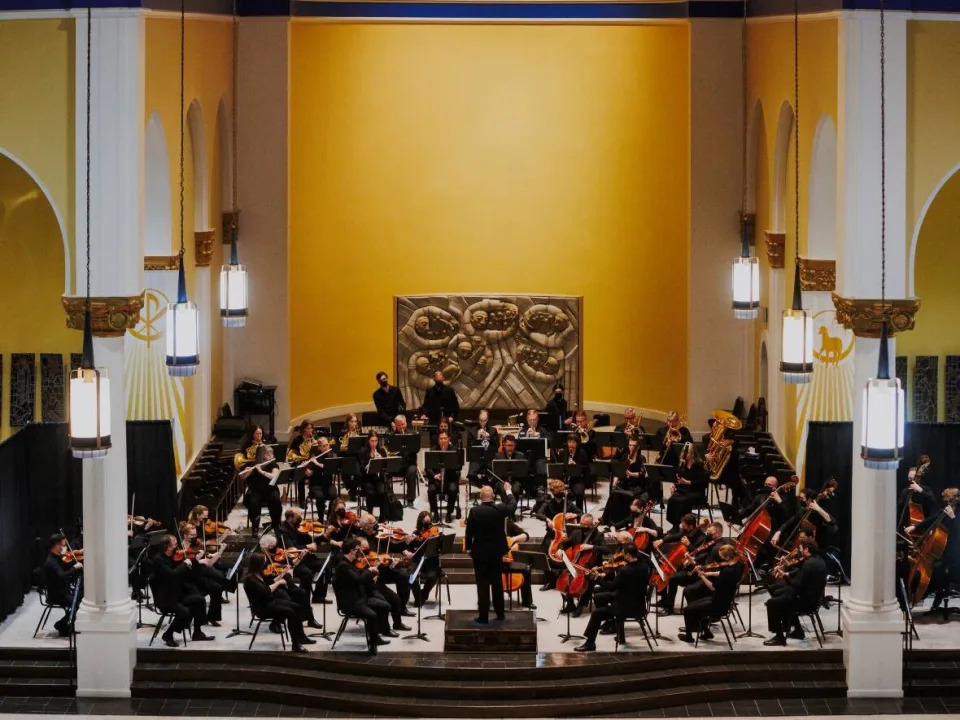
The Regina Symphony Orchestra performing at the Holy Rosary Cathedral. (Chris Graham - image credit)
Things are not looking good for the Regina Symphony Orchestra.
Audiences at RSO concerts have been much smaller than they were pre-pandemic — so much so that the orchestra has had to cancel three of its April shows, including one that was to feature a choir.
"This is sort of our plan to mitigate some of the financial risk that we are feeling very acutely," said Gordon Gerrard, musical director of the RSO.
"But I would say that if people don't start supporting us — both in terms of attending concerts and also if we don't find other means of support — then we are in a dire situation and we are at great risk, certainly."
At the beginning of the season in September, Gerrard says, the orchestra took a conservative view of ticket sales.
Even so, he said, "we haven't got anywhere close in terms of audience. We're seeing halls that are 20 per cent full, which, you know, just is heartbreaking for us."
"We know that we have lots of folks who love the RSO in our community, but we're just not seeing people returning in the way we expected."
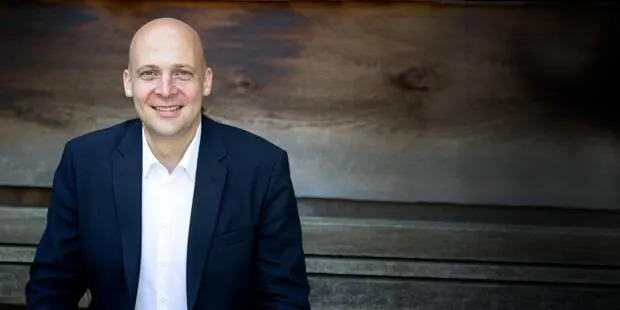
gordongerrard.com
Before the pandemic began, Gerrard says, the RSO could expect to fill 1,200 to 1,500 seats in the 1,900-seat Conexus Arts Centre.
"Now, we're seeing as low as 400 people so it's really a different world now, for sure. That much has become clear through the course of this season," Gerrard said
Gerrard says he believes the pandemic has changed people's habits, influencing many to stay home and get their entertainment online or through apps.
"I think we're now in a position where we need to change people's habits back," he said, "and to encourage people to come out to remind people what we can offer them."
That means the RSO will work to increase its social media presence and find new ways to reach potential audience members.
However, Gerrard added, low ticket sales are not just a problem in Regina.
"I do know that most of my colleagues across the country are experiencing what we're experiencing in that [there's] a huge downturn in ticket sales to the point where organizations are at risk," he said.
Saskatoon Symphony Orchestra sees uptick in sales
It's a different story in Saskatoon: The Saskatoon Symphony Orchestra is doing just fine, according to management.
Mark Turner, CEO and creative producer of the SSO, says ticket sales since September have exceeded their expectations.
"This year we are actually seeing a return to pre-pandemic levels, which has been really great for us. We've had a number of full sellouts of TCU Place and other venues … so we've been very fortunate," Turner said.

Julie Isaac Photography
The SSO is hosting a special Disney in concert program, featuring the music of Frozen, on March 18 at TCU Place. At first, Turner says, ticket sales for the event were slow, but now the production is on track to sell out.
"When we built this season, we were sort of rolling the dice — particularly, you know, we had two Disney shows. We had a big pop show [Dancing Queen] and those come at big price points, and so they were kind of calculated risks," Turner said.
The SSO scheduled that lineup with the assumption it would break even financially. Instead, it made a profit.
"We are seeing a lot of new people in our audience," Turner said. "When we live-streamed throughout the 2020/21 season, we were able to attract a different group of people — people who had been maybe symphony-curious but hadn't come out."
Over the weekend, Turner says, 25 per cent of an SSO concert audience of 1,300 were people under the age of 25.

Julie Isaac Photography
Montreal neo-Nazi found guilty of promoting hatred seeks appeal
Fri, March 3, 2023

Gabriel Sohier-Chaput, seen here at the Montreal courthouse last year, is seeking to appeal his guilty verdict. (Paul Chiasson/The Canadian Press - image credit)
A Montreal neo-Nazi who was found guilty of wilfully promoting hatred is seeking to appeal the verdict.
Gabriel Sohier-Chaput, 36, authored articles in a far-right publication under the pseudonym "Charles Zeiger." He was found guilty in the Court of Quebec on Jan. 23.
The case hinged on a single article written in 2017 for a far-right online publication, the Daily Stormer, which Sohier-Chaput claimed was satire.
Using antisemitic memes and editorial comments, the article entitled "Canada: Nazis Trigger Jews By Putting Up Posters On Ch--k Church," celebrated neo-Nazi posters pasted on a bus stop in British Columbia.
It also mocked a Holocaust survivor who had been interviewed about the incident, calling him an "oven-dodger," and called for "non-stop Nazism, everywhere, until the very streets are flooded with the tears of our enemies."
Sohier-Chaput's lawyer submitted his request for an appeal last week.
His lawyer wrote in the request that Judge Manlio Del Negro created an appearance of partiality in the courtroom.
The lawyer also claims the judge committed errors of fact and law in his analysis of Sohier-Chaput's credibility when he compared the accused to Machiavelli and implied that he had rallied his readers around the virus hatred. The lawyer said the judge didn't provide proof supporting that.
When Sohier-Chaput was found guilty, the judge described him as "extremely dangerous to the public" and ordered he be handcuffed immediately.
Sohier-Chaput is scheduled to be sentenced on May 11.
CRIMINAL COLONIALISM AND CAPITALI$MEight people arrested, charged in Norval Morrisseau art fraud investigation
Fri, March 3, 2023

Eight people have been arrested in an investigation into alleged fraudulent art sold for years under the name of famous Indigenous artist Norval Morrisseau, Ontario Provincial Police said Friday, noting some works were bought for tens of thousands of dollars.
More than 1,000 allegedly fake paintings, prints and other artworks were seized in the probe that has gone on for two and a half years, OPP said, adding they had worked closely with police in Thunder Bay, Ont.
"These are not small, victimless crimes," OPP Det. Insp. Kevin Veillieux said at a news conference. "These are people that took advantage of one man's legacy in order to turn a profit for themselves."
Morrisseau, also known as Copper Thunderbird, was a self-taught artist of Ojibwe ancestry who is considered a trailblazer for contemporary Indigenous artists across Canada.
Police have said allegations began to emerge of people creating and selling art under Morrisseau's name, and made in his distinctive Woodland School of Art style, before his death in 2007.
On Friday, OPP said one of the suspects arrested was "the architect" of a group in Thunder Bay that created the false paintings. Veillieux alleged that began around 1996.
The suspect forged some paintings himself before growing his organization into a full assembly line of painters, police said.
"(This suspect) orchestrated all aspects of this operation," said Veillieux.
"He was responsible for selling and consigning these fakes across Thunder Bay, Ontario and into Alberta, where they were then purchased by unsuspecting members of the public."
Another of the eight individuals charged also started a Thunder Bay-based group, this one around 2002, and recruited two Indigenous artists to create the fake artwork, one of whom was Morrisseau's nephew, said Veillieux.
The artwork was then often sold online to buyers around the world, police said.
A third group is alleged to have started around 2008, said Veillieux, operating in southern Ontario and allegedly providing false information regarding the authenticity and origin of the artworks.
"It was through technology and witness evidence that we have been able to identify much of the fraudulent art," said Veillieux.
Police said they made their arrests on Wednesday in Thunder Bay, Niagara-on-the-Lake, Simcoe County and a community near Markham.
Those arrested face a combined 40 charges, including forgery, defrauding the public over $5,000 and uttering a forged document.
"The arrests marked the dismantling of three distinct groups, groups that we believe exploited Mr. Morrisseau's name and his art legacy," Veillieux said.
Five of the eight suspects are residents of Thunder Bay, said Dan Taddeo, police chief of the northern Ontario city.
"The scope of this case is extraordinary," said Taddeo. "When the Thunder Bay Police Service began this investigation, we realized that it wasn't just local or even provincial or even national. It was international."
Morrisseau was from the Bingwi Neyaashi Anishinaabek, also known as Sand Point First Nation, and was the first Indigenous artist to have his artwork shown in a contemporary Canadian art gallery.
His official website said he was made a member of the Order of Canada in 1978 and was also awarded a posthumous lifetime achievement award in 2008.
"His contributions to Indigenous art and culture are incomparable," said OPP interim deputy commissioner Kari Dart. "These contributions and his global success may have made him an easy target for fraud."
In 2019, a Canadian musician was awarded tens of thousands of dollars by Ontario's top court, which said a Toronto gallery was deliberately elusive in proving the authenticity of a painting he purchased that was alleged to be done by Morrisseau. The Ontario Court of Appeal sided with Kevin Hearn, a member of the rock band the Barenaked Ladies, in his legal battle against the Maslak-McLeod Gallery and the estate of its late owner, Joseph McLeod.
This report by The Canadian Press was first published March 3, 2023.
Jessica Smith, The Canadian Press
Jordan's Principle explained: Canadian Human Rights Tribunal needed to make government accountable
Fri, March 3, 2023
“Jordan could not talk, yet people around the world heard his message. Jordan could not breathe on his own and yet he has given the breath of life to other children. Jordan could not walk, but he has taken steps that governments are now just learning to follow.” — Cindy Blackstock, executive director, First Nations Child & Family Caring Society
Jordan’s Principle is a child-first, needs-based approach named in memory of Jordan River Anderson, a First Nations boy from Norway House Cree First Nation in Winnipeg, Manitoba. Jordan was born with a rare multifaceted disorder and was hospitalized from birth. He died at the age of five, in the hospital, while provincial and federal jurisdictions argued for over two years and could not agree as to who was responsible for paying for his at-home care, services available to any other child in Canada without dispute.
Jordan’s Principle, a legal rule, ensures that First Nations children aged zero to 19 receive the same access to health, social and educational programs, services and supports as all other children in Canada.
In 2007, Jordan’s Principle received unanimous support in the House of Commons and was passed as legal rule. In the years following, from 2007 to 2016, the federal government did not adhere to the ruling and Indigenous children were unable to receive assistance through Jordan’s Principle. In 2016, the Canadian Human Rights Tribunal ruled in favour of First Nations children and ordered Canada to immediately do the following: cease its discriminatory practices regarding First Nations child welfare, reform the First Nations child welfare program, cease applying a narrow definition of Jordan’s Principle and take measures to implement the full meaning and scope of Jordan’s Principle for all First Nations children living on or off reserve.
Jordan’s Principle has created positive, transformative change, but the government’s implementation of the tribunal’s orders has been inadequate, including service gaps, delays and denials; these shortcomings seriously impact Indigenous children with disabilities and special needs. The level of service provided by the province or territory is the minimum standard. Service supports under Jordan’s Principle are based on what the child needs, not what the province or territory normally offers. The province normally delivers health care “off reserve,” while the federal government funds health care “on reserve.”
Despite changes to child welfare, First Nations children continue to face systematic barriers when it comes to education, health and social supports. The fact that Jordan had to be put in the child welfare system to be considered for services is tragic. Jordan’s Principle ensures that Indigenous children receive the care and support they need, at home.
Requests are based on the needs of the child on a “substantive equality basis.” Substantive equality means that First Nations children may need services and supports above what is ordinarily provided by the provinces and territories. The tribunal ruled that substantive equality is needed to address the impacts of Canada’s colonial history and discrimination against Indigenous peoples.
First Nations children on and off reserve experience challenges and barriers accessing care and services. Many First Nations communities do not have early intervention services available, impacting the development of a child with special needs. A 2013 study by Woodgate noted, “First Nations families have unique perspectives of disability and are more focused on what children with disabilities can do, and not what they are unable (to do).”
Research indicates there are disabling environments both on and off reserve, conditions or barriers that prevent families from having a life, which include structural (infrastructure, physical environments, transportation), social (lack of disability awareness), economic (poverty) and other barriers due to historical trauma and colonialism. Services and supports received through Jordan’s Principle should not be regarded as benefits but rather rights under the orders of the Canadian Human Rights Tribunal.
Jordan’s Principle is included as the third of the 94 Calls to Action from the Truth and Reconciliation Commission.
Jordan River Anderson’s legacy initiated change and the need for Canada to move beyond the standard of basic survival for First Nations children, to a human rights level of equality and inclusion. Jordan’s Principle is not a substitute for systematic reform, but a stepping-stone toward it. Government and community organizations must build capacity and create space across all sectors to ensure Indigenous children are no longer left behind.
To submit a request for services through Jordan's Principle, call the 24-hour line at 1-855-JP-CHILD (1-855-572-4453) or visit canada.ca/jordans-principle. If you have any difficulties accessing services through Jordan's Principle, contact your provincial child advocate or ombudsperson.
Joyce Jonathan Crone is a Local Journalism Initiative reporter. She is Mohawk, born on the Six Nations Reserve. A retired teacher, she now makes Huntsville her home.
Joyce Jonathan Crone, Local Journalism Initiative Reporter, Parry Sound North Star
'Extremely dangerous': Spike in illegal crossings at Canada-Vermont border has feds sounding alar
April Barton, Burlington Free Press
Mon, February 27, 2023
BURLINGTON, Vt. — Migrants passing into the U.S. by illegal means via Swanton, Vermont have escalated massively in recent months.
Between October and January, apprehensions and encounters at the Canadian border have jumped nearly 850% compared to the same four months a year ago, according to U.S. Customs and Border Protection's Swanton sector.
During the month of January there were 367 encounters, more than the past 12 years of January totals combined, said Ryan Brissette in a press release for the Swanton border patrol.
The number of border patrol encounters in Swanton started to climb in July 2022. During the seven-month window through January 2023, there have been 2,070 instances of illegal crossings. In that same period, there were 258 the year prior and 225 the year before that.
Northern and Southern borders see uptick in rescues
The uptick is causing problems for officials, especially considering dangerously cold temperatures that have put border crossers' and border control agents' lives at risk. Brissette noted -4 degree temperatures and "life-saving aid" that was provided during encounters in Newport, Vermont, and Burke, New York.
More: Arizona will keep sending migrants where 'they actually need to go'
"It cannot be stressed enough: not only is it unlawful to circumvent legal means of entry into the United States, but it is extremely dangerous, particularly in adverse weather conditions, which our Swanton Sector has in incredible abundance," Swanton Sector Chief Patrol Agent Robert N. Garcia said in a press release.
The southern border has also seen an increase in rescues, as the U.S. places a renewed emphasis on rescuing migrants and historically high numbers of immigrants seek asylum at U.S. borders.
The numbers at the southern border, the nation's busiest corridor, show a sharp increase in border rescues, according to data released this month from U.S. Customs and Border Protection, the agency overseeing Border Patrol:
5,336 migrants rescued at southern border in fiscal year 2020.
12,857 migrants rescued at southern border in fiscal year 2021.
22,014 migrants rescued at southern border in fiscal year 2022, which ended in September.
In fiscal 2021, agents at the southern border tallied 568 migrant deaths, the highest ever recorded.
Most of the deaths (219) were attributed to "environmental exposure-heat" as people trek through blazing terrain in Arizona and Texas. Agents also counted 86 deaths as "water-related" as migrants try to cross canals or the swift-moving Rio Grande, which divides the U.S. and Mexico.
Immigration advocates and experts believe the border death toll is much higher, and the federal system for death data long failed to include many border deaths.
The Wall: ‘Mass disaster’ grows at the U.S.-Mexico border, but Washington doesn’t seem to care
Who is crossing the Vermont-Canadian border
There are no clear-cut answers as to why people are crossing as the circumstances differ for each person or group, said Steven Bansbach, a public affairs officer for U.S. Customs and Border Protection. Many are being dropped off near the border by car and then proceeding across land on foot, he said.
Among the border crossers are family groups that include infants and children who are particularly vulnerable to the cold. Bansbach said many are crossing at night while cold and sleep deprived, all of which can be disorienting.
Border patrol usually detains, arrests and sends those apprehended back to where they came from, according to Bansbach.
Fact check: False claim that those in country illegally can become police officers in California
More: Rescues of asylum-seekers soar as Border Patrol ramps up efforts and more migrants arrive
Looking at the countries of origin of encounters involving the border patrol in Swanton, a vast majority are from Mexico. Among the 1,513 encounters from October through January, 945 originated from Mexico.
"They may be trying to find a path of least resistance to enter into the U.S.," Bansbach surmised. "And they may know there's a conundrum at the southwest border and so they may find that the northern border they may sneak across to have a better advantage."
The U.S.'s southern border has been a point of contention, from border walls, to the separation of children and parents, to immigrants being caught up in political brinkmanship being shipped from southern states to northern ones, in some cases dropped off on a political opponent's doorstep.
Follow April Barton at on Twitter @aprildbarton
Contributing: Rick Jervis, USA Today
This article originally appeared on Burlington Free Press: U.S. Border Patrol in VT sees winter increase in illegal crossings
ONTARIODoctors behind private surgical group defend 'new model of care'
Fri, March 3, 2023
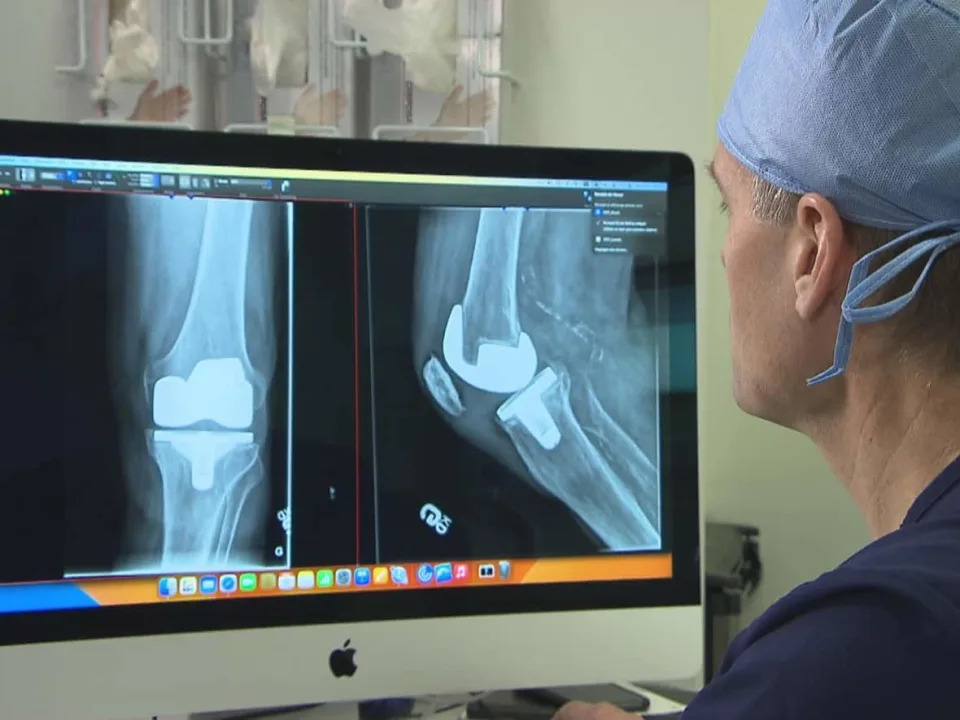
A doctor studies images of a patient's knee replacement surgery at a private medical facility in Laval, Que. The orthopedic surgeons behind a private group performing similar procedures at the Riverside campus of The Ottawa Hospital on weekends is defending the partnership. (Louis-Marie Philidor/CBC - image credit)
The doctors behind a private corporation that's performing joint replacement surgeries at the Riverside campus of The Ottawa Hospital (TOH) on Saturdays are defending the arrangement, which some critics view as another step toward the creeping privatization of Ontario's health-care system.
As CBC News reported this week, Academic Orthopedic Surgical Associates of Ottawa Inc. (AOAO), a group led by eight Ottawa surgeons who all practise out of TOH, performed the first round of 10 surgeries at the Riverside on Feb. 25. AOAO was registered as a business in Ontario in December 2021.
As surgeons, we hear the distress, pain, and the limitations to the quality of life our patients are experiencing. - Academic Orthopedic Surgical Associates of Ottawa Inc.
CBC News first became aware of the partnership in January, but the hospital did not confirm it until Feb. 16, when it announced it was "working with [AOAO] to increase capacity for orthopedic procedures, such as hip and knee replacements" at the Riverside, where operating rooms were "previously unused on weekends."
The arrangement is "in line with the Ontario government's plan to expand surgical capacity," according to the announcement.
Advocates and experts interviewed by CBC are viewing the partnership between TOH and AOAO in a different light, however. Some are asking why, since they rely on existing medical staff and hospital facilities, the surgeries aren't being performed under the existing public health-care structure.
"Why not use what you already have instead of taking this step toward privatization?" asked Rachel Muir, a registered nurse and the Ontario Nurses' Association's (ONA) bargaining unit president at TOH.
'The need to act is now'
According to a statement issued Thursday evening by TOH on behalf of AOAO, the surgeons' primary motivation in introducing this "new model of care" is relieving the existing backlog in access to orthopedic procedures that has left many patients waiting too long for surgery.
"This, combined with the growth expected in the future, means we need to find new solutions to ensure patients get the care they need. As surgeons, we hear the distress, pain, and the limitations to the quality of life our patients are experiencing. The need to act is now to respond to these patient concerns," according to the statement.
"Working with The Ottawa Hospital will allow us to strengthen access, quality, and service delivery for patients requiring orthopedic care across the region."

Nicole Beswitherick/CBC
According to the statement, AOAO is renting the operating rooms at the Riverside, but "has purchased its own equipment to perform these surgeries."
The statement does not specify how much AOAO is paying to rent the surgical space, nor what equipment it provides. AOAO later clarified that its surgeons provide "all instruments and equipment required to perform a hip or knee replacement," but uses the hospital's existing infrastructure such as operating room lights.
Anyone undergoing surgery is a registered TOH patient and "all services are billed through OHIP, as per standard practice," according to the statement, which describes the arrangement as "a cost-recovery model."
Surgical staff including registered nurses, registered practical nurses and clerical staff who volunteer to work the 10-hour Saturday shifts are being offered a per diem by AOAO that's roughly double what they'd earn for a regular eight-hour hospital shift, however they're responsible for their own insurance, CBC News has learned.
Minister defends partnership, applauds TOH
According to AOAO, the group includes 26 orthopedic surgeons. The Ontario Business Registry lists eight surgeons as "active directors."
CBC News has made numerous attempts to contact the surgeon listed as chair of the group, and on Thursday attempted to contact the other seven directors, all of whom practise out of TOH and most of whom are also affiliated with the University of Ottawa. Until Thursday's statement, the group had not commented publicly.
CBC News requested an interview Friday with the hospital's president and CEO Cameron Love, but was told he's unavailable.
A spokesperson for Ontario Health Minister Sylvia Jones also turned down an interview request on Friday. On Thursday, Jones's office issued a statement lauding TOH for "taking innovative action to eliminate the joint replacement surgical backlog and reduce patient wait times so more Ontarians can receive the care they need, closer to home."
In response to an access to information request from CBC News, the ministry said last month it had no records regarding the partnership between TOH and AOAO.
At Queen's Park on Thursday, Ottawa Centre MPP Joel Harden questioned Jones about the partnership.
"Will this government get public operating rooms fully up and running for everyone?" asked Harden, who characterized the arrangement to lease the publicly funded facilities to a private corporation as "selling them off or renting them out."
"I can tell you, there are some innovative models that are happening in the province of Ontario that are leading to successes," Jones replied. "It is a good news story, and we will continue to invest in those innovative models."
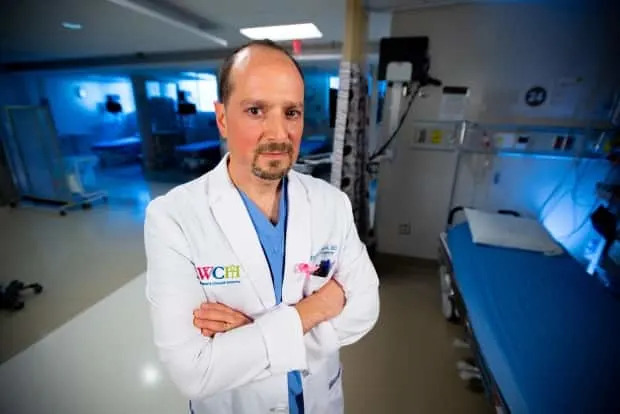
Craig Chivers/CBC
Use existing resources, surgeon urges
Dr. David Urbach, head of the department of surgery at Women's College Hospital in Toronto and professor of surgery and health policy, management and evaluation at the University of Toronto, agrees that Ontario's capacity to provide joint replacement surgeries is insufficient to meet the current demand.
"That is why many patients are suffering in pain waiting too long for surgery," said Urbach.
However, he believes that could be solved with proper funding and planning, and by introducing a centralized "single-entry" referral system for patients to avoid bottlenecks.
"There is no reason why additional surgeries could not be done in Ontario public hospitals," he said. "There are many operating rooms in Ontario hospitals that are unused — but could be used — due to lack of funding and staffing, especially nurses.
"From a business and quality of care perspective, it would be a much better strategy for Ontario to maximize delivery of surgery in our existing public hospitals."
The Toronto Star, quoting a retired Ministry of Health lawyer, reported on Thursday that under Section 4 of Ontario's Public Hospitals Act, no land, building or other premises belonging to a hospital can be sold, leased or mortgaged without the minister's approval.
On Thursday, the ministry told CBC that because the operating rooms belong to TOH, and the procedures provided in them are insured hospital services, the hospital does not require the minister's approval for uses such as the current partnership with AOAO.
Through TOH, CBC News has also asked AOAO whether it's charging a 50 per cent premium for weekend surgeries provided under OHIP as part of its "standard practice" mentioned earlier.
UK
Striking nurses need to shout to make this government listen
Rebecca Roncoroni
Fri, 3 March 2023
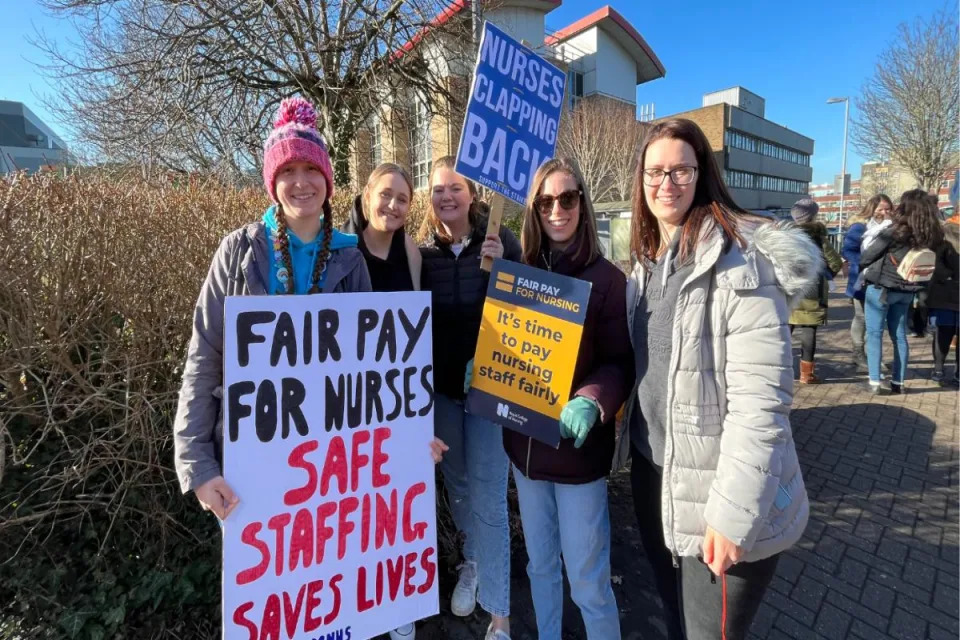
Striking nurses outside a hospital in Southampton. (Image: Newsquest)
I trained as a nurse in 1996 aged 29 with three young children and a husband who had been made redundant.
I received a basic bursary of around £5000 (equivalent to £12,008.23 today plus a top up to £7,600 (equivalent to 18,012.34 today) as I had three children and an unemployed husband.
There were no student loans. Under current circumstances there is no way that would have been possible.
We were seen as part of the service we were training to become part of. A little like a soldier in training (will they be paying student loans next?).
Read more: Letter urges bishop to pray for NHS in crisis
From the first placement onwards we worked long shifts, studied long hours, commuted, sometimes daily, to QA Hospital nursing school, and Portsmouth University, and were expected to follow the Nursing and Midwifery Council Professional Code of Conduct to the letter from the very beginning.
In our Professional Code of Conduct is was drummed into us that as nurses we were accountable practitioners, which meant that if we failed to put the patients health and safety first, we would be held liable and could be struck off and charged if necessary.
So, if a doctor made a mistake on a prescription and you gave the medication without checking the prescription and patient, you were equally culpable for any consequences. It gave nurses the power to say no to policies and procedures that go against the patients best interests and in theory protected them for doing so.
Nurses are not just striking because of poor pay. Of course that is part of it. People need to be able to live in a warm house, eat good food, wear comfy shoes, rest.
Read more: NHS strikers spotted outside Island hospital
But the huge demoralisation of being forced to work in conditions that are unsafe for patients puts nurses in a terrible position.
According to their professional code of conduct and, lets face it, their humanity, they must speak up and about what is happening within their wards. Because right now, the Professional Code of Conduct is being made a mockery of by this Government.
No nurse would choose to leave patients in pain, hungry, lonely, lying in urine, and overdue their medication.
Yet every single day they are forced to prioritise the most pressing tasks only a qualified nurse can do, knowing that there is inadequate staff to wash, feed, turn, reassure and tend the patients as they should be nursed.
It is soul destroying to work in a job that you have a true vocation for and be set up to fail in your duty every single day. You wonder if by carrying on, are you colluding with a cruel system, but if you leave what will happen to the patients?
Please support to the nurses when they talk about why they are striking. They are speaking for us all. They are representing a voice that needs amplifying to the point of deafening for the Government to start listening. We need to support them in order for them to support us. They are speaking the truth to power.
I support them with every fibre of my heart.
B.C. firm retracts claim of licence to sell cocaine after prime minister and premier weigh in
Fri, March 3, 2023
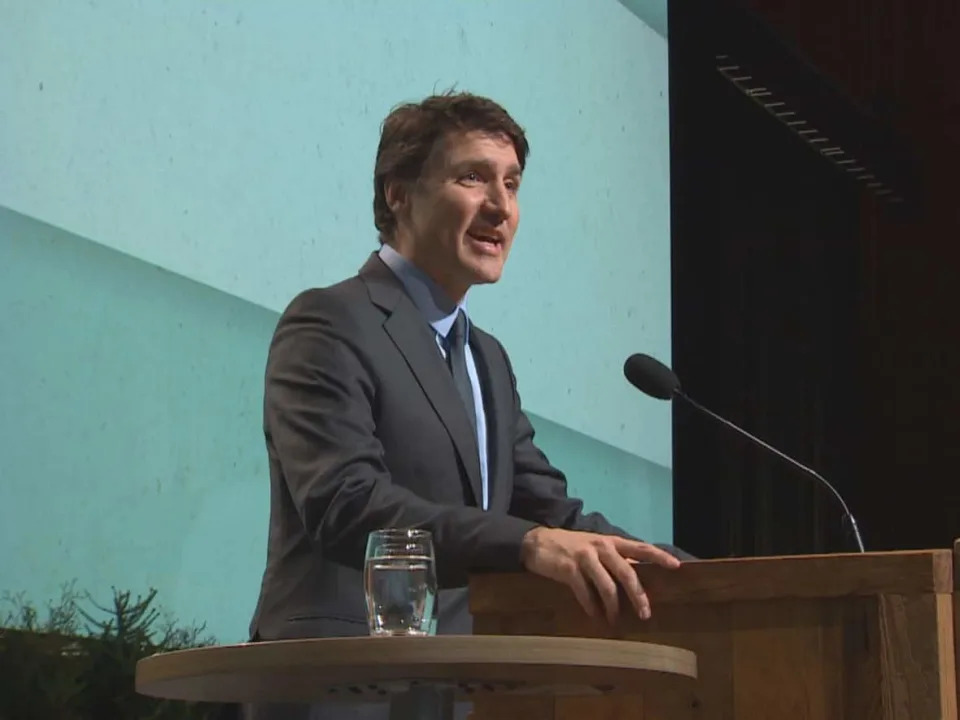
Prime Minister Justin Trudeau in Vancouver on Thursday. (CBC News - image credit)
Prime Minister Justin Trudeau says he is "as surprised as" British Columbia Premier David Eby after a firm announced it had received Health Canada licence amendments to produce and sell cocaine.
Trudeau said Friday the federal government was "working very quickly" with Adastra Labs of Langley, B.C., "to correct the misunderstanding" caused by the company's statement saying it was looking at commercializing cocaine as part of its business model.
He said Adastra did not have permission to sell cocaine on the "open market," while Health Canada said the firm could only sell to other licence holders, and its licence is for "scientific and medical purposes only."
"Health Canada has contacted the company to reiterate the very narrow parameters of their licence," the federal agency said in a written statement. "If the strict requirements are not being followed, Health Canada will not hesitate to take action, which may include revoking the licence."
On Friday afternoon, Adastra retracted its statements regarding the Health Canada approval.
"The Dealer's Licence issued to Adastra Labs does not permit Adastra Labs to sell coca leaf, psilocybin or cocaine to the general public," it said in a statement. "For cocaine, and under the Dealer's Licence, Adastra Labs is only permitted to sell to other licensed dealers who have cocaine listed on their licence."
This comes as a second B.C. company says it has a licence related to cocaine and MDMA, also known as ecstasy.
Victoria's Sunshine Earth Labs, a biosciences firm that "aims to bring a safer supply of drugs to the global market," says it obtained an amended Controlled Drug and Substances Dealer's Licence to include MDMA and cocaine last year.
However, like Adastra, its licence is for authorized medical and research purposes only, and it is not permitted to sell these drugs to the general public, according to Health Canada.
Canada not considering commercial cocaine: PM
In a written statement, Health Canada says it "thoroughly reviews applications" to ensure licensees follow all existing policies on public health and safety.
When asked how many other companies have received similar amendments to their licences, the agency said it does not share or publish the list of companies who have received licences, nor does it discuss the status of applications for licensing amendments due to safety, security and privacy reasons.
Trudeau said commercializing decriminalized cocaine "is not something that this government is looking at furthering."
"I was as surprised as the premier of British Columbia was to see that a company was talking about selling cocaine on the open market or commercializing it," he said, adding that Adastra's licence was "not a permission to sell it commercially or to provide it on an open market."
B.C.'s drug decriminalization policy went into effect at the end of January, allowing individuals 18 and over to possess up to 2.5 grams of opioids, cocaine, methamphetamine and MDMA without criminal penalties.
The decriminalization is a three-year pilot project.
Licence not part of provincial plan: Eby
The public uproar began after B.C. Opposition leader Kevin Falcon raised the issue during question period at the provincial legislature on Thursday.
In response, Eby said he was "astonished" by the news, and the province had not been notified or consulted by Health Canada on the matter.

CBC News
"I think that Health Canada needs to have a serious look at what they are doing. I think they have to have a serious look at this company," Eby said.
Eby said Friday that he has spoken to the federal government and that he is "further disturbed" to hear from Health Canada that Adastra "significantly misrepresented the nature of the licence" in an irresponsible manner.
"I find it more than a little bit frustrating that Health Canada is not apparently in line with us in terms of the direction we're going," he said. "We need to work together on the toxic drug crisis and our response to it."
Eby said the licence "is not part of our provincial plan," referring to the ongoing effort to stem the overdose death rate, with an average of more than six people dying every day in B.C. last year.
For its part, Sunshine Labs said it "does not engage in promoting or launching safer supply initiatives" and defers the implementation of policy on decriminalized cocaine, opium and MDMA to experts.
But the company also said the elevated overdose death rate in B.C. coincides with public health officials' reports that the majority of deaths came from occasional, rather than chronic, users.
That means decriminalization may not be enough, Sunshine Labs' statement says, and points to some experts suggesting providing users with "an opportunity to purchase certified drugs with known levels of purity and quantity" as a way to prevent deaths.
"While this notion may be difficult for some to accept, it represents the rational next step," the statement said.
Up to the gills in goldfish: Large invasive fish a problem in B.C. waters: expert
Fri, March 3, 2023

KAMLOOPS, B.C. — A researcher says pet owners who dump their unwanted goldfish into British Columbia's waterways are putting native fish populations at risk.
Brian Heise, an associate professor in the department of natural resource sciences at Thompson Rivers University, says thousands of large, invasive goldfish — some as big as footballs — have multiplied in bodies of water around the province.
He says female goldfish can release 50,000 eggs at a time, three times a summer, they compete with native species for food and space, and carry diseases that can spread to other fish, including the salmon population.
Over the last decade, Heise says goldfish populations have spread from the Vancouver area to lakes in the northern and Interior parts of the province.
He says the province needs to continue funding an expensive practice called electrofishing where electric current is passed through the water to stun the fish, allowing them to be scooped out.
The researcher also says work needs to be done at pet stores so customers can return unwanted animals instead of dumping them.
This report by The Canadian Press was first published March 3, 2023.
The Canadian Press
Province halts old-growth logging in at-risk owl territory another two years
Fri, March 3, 2023 at 2:31 p.m. MST·1 min read
VICTORIA — The British Columbia government says it's extending an old-growth logging ban for part of the Fraser Canyon for another two years to help with the recovery of the endangered spotted owl.
The province says deferring logging activity in two watersheds in the canyon is part of its plan to bring back a "sustained breeding population" of the owl.
The province says it has extended the suspension of old-growth logging activity in the Spuzzum and Utzilus watersheds until February 2025.
Forests Minister Bruce Ralston says further extending the logging deferral in the more than 32,000-hectare area will support recovery efforts to increase the bird's population.
The province says there are only three of the birds known to live in the wild in B.C., two of which were released by a breeding facility in Langley in August last year.
Nathan Cullen, the minister of water, land and resource stewardship, says the logging deferrals are an "important component" of the government's plan to reintegrate the species into its natural habitat.
This report by The Canadian Press was first published March 3, 2023












